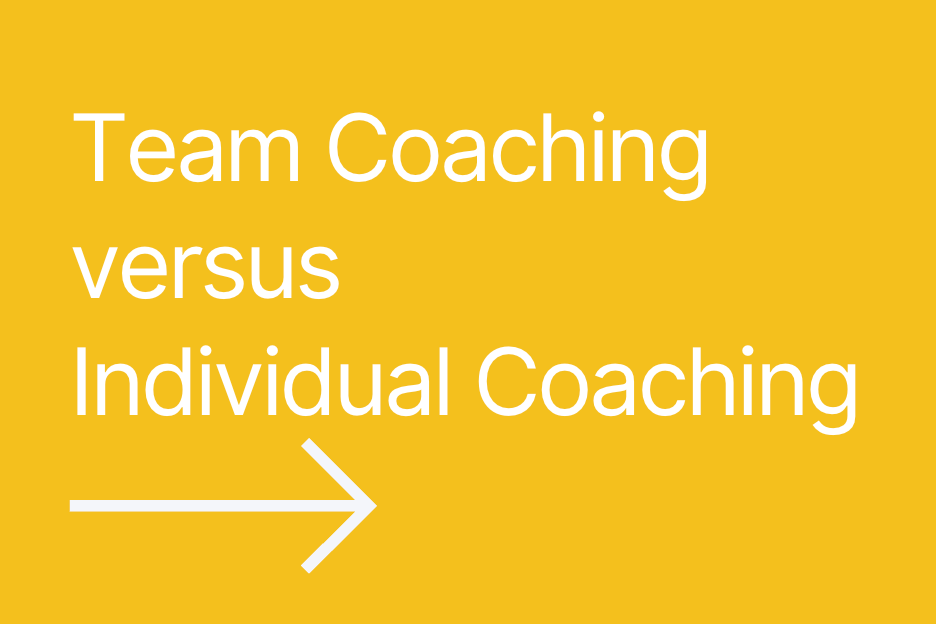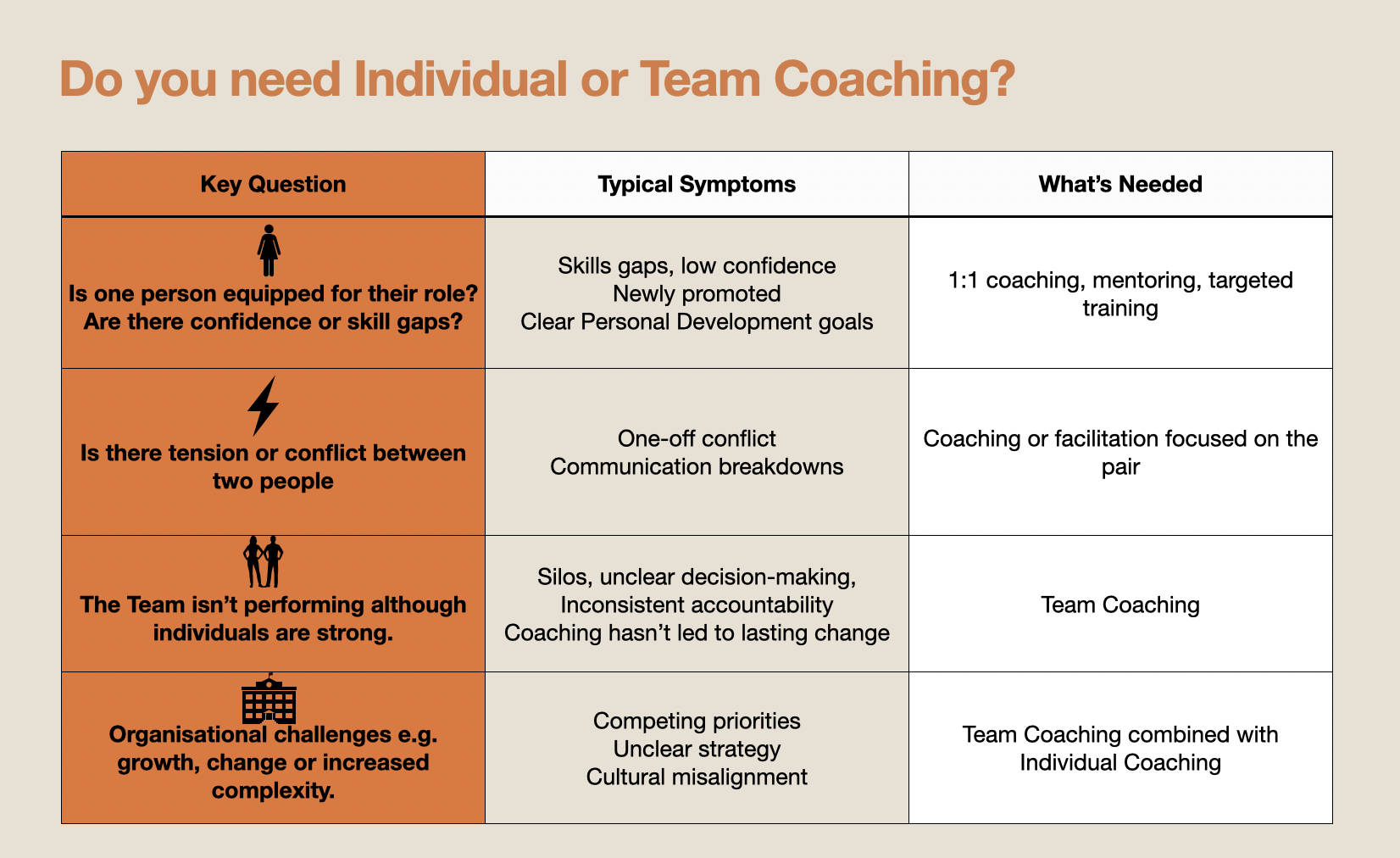
BLOG
Inspiration and news
Team Coaching verus Individual Coaching
You’ve invested in coaching for individuals, but something still isn’t shifting. This is where lots of organisations get stuck: it’s easy to assume the problem lies with an individual and to send them for coaching. But sometimes, the challenge isn’t one person, it’s in how the team works together (or doesn’t).
That’s where Team Coaching comes in.
How to spot whether you're dealing with a personal development need or something in the team dynamic.
You’ve invested in coaching for individuals, but something still isn’t shifting. Perhaps meetings are going round in circles, communication. feels clunky, decisions are slow, people aren’t doing what they say they will, and there may be tension in the air, but no one’s naming it.
So what’s the real issue? And what do you do now?
This is where lots of organisations get stuck: it’s easy to assume the problem lies with an individual and to send them for coaching. But sometimes, the challenge isn’t one person, it’s systemic. It’s something in how the team works together (or doesn’t).
What Individual Coaching Does Brilliantly
Stepping into a new role, tackling imposter syndrome, and adjusting to a new level of responsibility.
Developing confidence with giving feedback, difficult conversations, influencing, or strategic thinking.
Working through personal blocks like conflict avoidance or perfectionism.
Self-Awareness and EQ – Deepening reflection and emotional intelligence.
How to spot when Individual Coaching isn’t enough
The Revolving Door Problem - your leaders have been coached on similar issues, but the patterns repeat. It’s not them. It’s the system they’re in.
The Post-Coaching Plateau - Someone returns energised from coaching, but nothing changes. Their insight doesn’t stick because the team’s culture and habits haven’t changed.
The Invisible Stakeholder Trap - People make decisions without input from the right people. Coaching might help one person ask better questions, but it won’t fix the wider issue of unclear stakeholder engagement.
The Accountability Gap - People hesitate to call things out or challenge one another. Assertiveness coaching won’t help if the team hasn’t built psychological safety.
Competing Priorities, Constantly - Each person is doing their job well, but they’re heading in different directions. The team hasn’t agreed on what success looks like together.
What Team Coaching Builds That Individual Coaching Can’t
When the root causes are systemic, team coaching focuses on the collective, not just the individuals. Here’s what that can unlock:
Stakeholder-Focused Thinking - Teams get clearer on who they serve (internally and externally) and align around what their stakeholders truly need. Instead of each person building their shared stakeholder map, the team co-creates one together.
Joined-Up Decisions and Priorities - Team coaching surfaces how decisions are made (or not). It helps the team agree on how to prioritise, who decides what, and where alignment is needed, so there’s more clarity and less second-guessing.
Honest, Constructive Dialogue - Instead of avoiding the hard conversations, teams learn how to speak openly and disagree productively. This builds trust and psychological safety and gives people shared tools and language for navigating tension.
Collective Learning and Adaptability - Teams need space to reflect together—not just individually. Coaching encourages habits of reflection, experimentation, and shared learning that help the team improve how they work over time.
Shared Leadership and Collaboration - It’s not always about who’s in charge. It’s about flexing leadership based on strengths, context and what’s needed. Team coaching helps teams move from hub and spoke leadership to shared responsibility.
Integrating Individual and Team Coaching
The most powerful transformation happens when individual and team coaching work together strategically:
Individual coaching to ensure each team member has the personal foundation for effective collaboration
Team coaching to build collective capability and address systemic issues,
Individual coaching to help leaders integrate new team practices into their personal leadership approach
One size does not fit all
The question isn't whether individual or team coaching is better; it's about discovering which is right for the the challenge, the individuals and the team.
The most successful organisations I work with treat individual and team coaching as complementary capabilities in their leadership development toolkit. They invest in both, but deploy them strategically based on an accurate diagnosis of what's really needed.
Not Sure What You Need - I Can Help
If you’re not sure whether the issue sits with one person or the team as a whole, I can help.
My work often begins with a short discovery phase: a series of interviews, a team diagnostic, or a workshop to help you understand what’s really going on. From there, we can clarify whether individual coaching, team coaching, or a combination of both will move things forward.
Learn more about how I support Team Effectiveness >
Discover how I support Leaders and Individuals through Coaching >
Or get in touch to start a conversation about what might be possible for your team.
Email: polly@pollyrobinson.co.uk or call 07966 475195.
Do I need an Executive Coach?
Do I need an Executive Coach?
Have you ever thought about working with an Executive Coach, but not sure if it’s right for you?
Do I need an Executive Coach?
Have you ever thought about working with an Executive Coach, but not sure if it’s right for you?
Coaching is for anyone who wants to unlock their full potential.
A coach will help you explore your business and personal development goals and ambitions and achieve them. They can support you to build self-awareness, emotional intelligence, confidence, leadership and relationships with others.
An Executive Coach will act like a sounding board to help you think through, clarify your thoughts, shift perspective, resolve challenges and achieve your goals. Coaching is forward-looking and action-oriented.
A Coach is always on your side, they’re not there to tell you what to do, but as your guide. They will help you create a plan, help you celebrate what you have achieved and hold you accountable for achieving more.
Coaching will help you to:
Build self-awareness and emotional intelligence.
Make clear decisions and get stuff done
Enhance your leadership and management skills
Improve your relationships with others
Sharpen your communications skills
Be more confident and resilient.
What is Coaching
1. SPACE FOR YOU
When business and life are so busy, it’s often impossible to step back and see things with perspective. Time with a coach encourages you to stop, step back, and gain perspective. It encourages you to make time to ’work on’ the business or yourself. Your time with a coach is space for you alone - it’s entirely non-judgemental, private, and confidential.
2. YOU SET THE AGENDA
The focus of the coaching is down to you. Working with a coach usually begins with an exploratory chat to identify the topics or themes you want to work on over a number of sessions.
The coach will guide you through a series of conversations to dig deep into those topics. The coach’s role is to make the discussions as constructive as possible.
3. FEEL HEARD
Leadership is lonely. When was the last time you felt someone was entirely focussed on listening to you and had the time and space to focus on you? A coach is there to listen and support. Coaches are experienced in deep listening. You are free to talk about anything you need including things, that you feel you can’t talk about with your manager, your colleagues, your family or friends. A coach won’t judge or criticise.
4. FIND CLARITY, SHIFT YOUR PERSPECTIVE AND OVERCOME OBSTACLES
Unlike counselling or therapy which tends to unpack the past, coaching is about the future. It’s about growth and development. Although it may sometimes involve exploring self-sabotaging thoughts or blocks that have held you back in the past, so you can move around them.
5. MAKE BETTER DECISIONS
Making big decisions can be stressful - sometimes we get lost in all the what-ifs. A coach will help you to evaluate the options and possible outcomes. Giving you perspective to make decisions more easily and confidently and reduce stress.
6. FOCUS ON THE FUTURE
A coach will help you to identify and achieve goals. A business coach may work with you to identify business objectives, while an executive or leadership coach help you to develop such as boosting confidence, improving time management, building better relationships or becoming a better leader.
7. MOTIVATION AND STIMULATION
Finally, coaching can be fun and rewarding. A coach should inspire and motivate you. It will stimulate you to explore new options and motivate you to move forward. Importantly a good coach will provide a relaxed, empathetic environment where you feel safe and can smile.
How to choose a coach
If you are thinking about working with a coach it is important to find one that you like and can connect with and build rapport. You can get a good sense of a coach from their website but you should request an initial chat to find out more about them and establish if there is a good fit.
How does coaching work in practice?
Executive coaching takes place across a number of sessions over a period of time, typically 9–12 sessions across 6–9 months. The space in between sessions is important so the leader can test out new approaches and behaviours they have committed to in their previous session, then debrief and build on it in the next session. Executive coaching sessions can be delivered either face-to-face or virtually. A mixture of both can be used over time.
Work with me - Polly Robinson Executive Coach / Leadership Coach
I am a qualified Executive Coach and Mentor (ILM Level 7) working with business leaders and senior managers in all sectors. I will become a supportive friend, a listening ear, and a shoulder to lean on.
I’m based in Bristol and coaching people across the South West, London, Wales and all over the UK. I work with coachees face-to-face or online via Zoom or other video platforms.
We will build a strong and trusting relationship, where I will support and challenge you to focus on your values and what is important for your business and your life to inform your decisions and choices. You will identify objectives and remove the barriers that may be getting in the way of continued growth and success.
We will create space for a series of constructive conversations where you are able to be open and honest and sometimes tackle difficult topics. I will support and sometimes challenge your perspective - helping you to understand yourself better.
Free trial coaching session
If you’d like to find out more about whether coaching is right for you, and take advantage of a free 30min coaching session, contact me.




